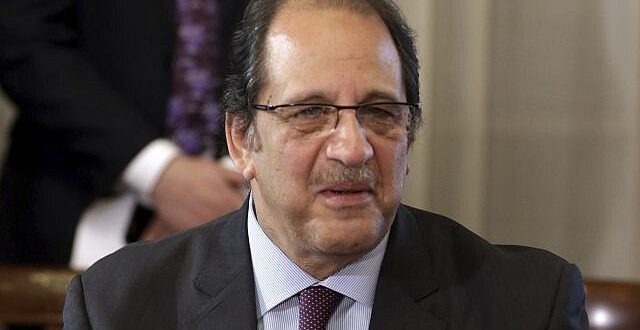Eyal Hulata and Meir Ben-Shabbat reportedly sit down with Abbas Kamel to discuss maintaining Gaza ceasefire brokered more than two months ago by Egypt
The incoming and outgoing heads of the National Security Council reportedly traveled to Cairo on Sunday where they met with Egypt’s intelligence chief to discuss upholding the fragile ceasefire between Israel and Hamas that was brokered by Egypt after 11 days of fighting in May.
The meeting reported by the Walla news site between Meir Ben-Shabbat, Eyal Hulata and Egyptian General Intelligence Directorate chair Abbas Kamel, came roughly two months after the latter visited Israel and met with then-prime minister Benjamin Netanyahu to bolster the ceasefire.
Hulata was announced as Prime Minister Naftali Bennett’s pick for National Security Council chief last month, pending cabinet approval. He was in Washington last week for meetings with senior Biden officials in preparation for Bennett’s White House visit that could is slated to take place in the coming weeks.
Last month, an official familiar with the indirect negotiations between the sides in Cairo, told ToI that Israel and Hamas are “on a path” toward another round of violence just weeks since the most recent flareup in the Gaza Strip.
The official noted Israel’s toughened stance since the 11-day May conflict vis-a-vis the Kerem Shalom goods crossing, where only limited humanitarian essentials, such as food, medicine and fuel, have been allowed in and almost all exports have been barred. Defense Minister Benny Gantz has also led a policy conditioning the rehabilitation of the Strip on the return of a pair of Israeli civilians and the bodies of two fallen IDF soldiers being held by Hamas.
The official familiar with the negotiations also pointed to Hamas’s “emboldened” position since the conflict, which its leader Yahya Sinwar has characterized as a victory over Israel, all while public support for the rival Fatah movement led by Palestinian Authority President Mahmoud Abbas continues to plummet.
The two competing realities — a hardened Israel and an invigorated Hamas — have not boded well for Egypt-mediated negotiations that began last month in Cairo, the official said.
Discussing Israel’s position on Gaza reconstruction, a senior Israeli official acknowledged to ToI last week that while the main players of the talks in Cairo may be Israel and Hamas, Jerusalem has been adamant that the negotiation table be expanded to include Ramallah.
“We are saying that the PA needs to be part of this equation… because it is the moderate faction,” the official argued.
Israel is hoping this approach will result in Ramallah being tasked with distributing Qatari humanitarian aid in Gaza, the official said, while admitting that the matter is more dependent on approval from Hamas and Qatar.
PA minister Ahmad Majdalani said last week that officials in Doha and Ramallah agreed on a broad framework to again transfer Qatari funds to the Gaza Strip, but Palestinian banks are holding up its implementation.
Since 2018, Qatar has provided over $300 million in subsidies to Gaza, which is ruled by Doha’s Hamas clients. Israel allowed the funds into the tightly blockaded coastal enclave in exchange for quiet on its southern border.
The Qatari projects funded fuel for Gaza’s only power plant and hospitals to shore up the enclave’s damaged healthcare system. They also brought in hundreds of millions in cash payments to both 100,000 poor Gazan families and to Hamas’s civil servants.
Qatar rejects frequent accusations that the money goes to terror groups in the enclave, saying Israel knows how the money is distributed.
The tentative agreement revealed by Majdalani has prompted concern among Palestinian banks, which are said to be worried about being slapped with sanctions should their money go to Hamas. The international community largely boycotts the terror group and cracks down on financial institutions that deal with it.
A possible way around the sanctions would be to transfer the money through post offices in the Strip, instead of the banks, a recommendation that has been passed along to PA officials, a source familiar with the negotiations told The Times of Israel.
 Eurasia Press & News
Eurasia Press & News




